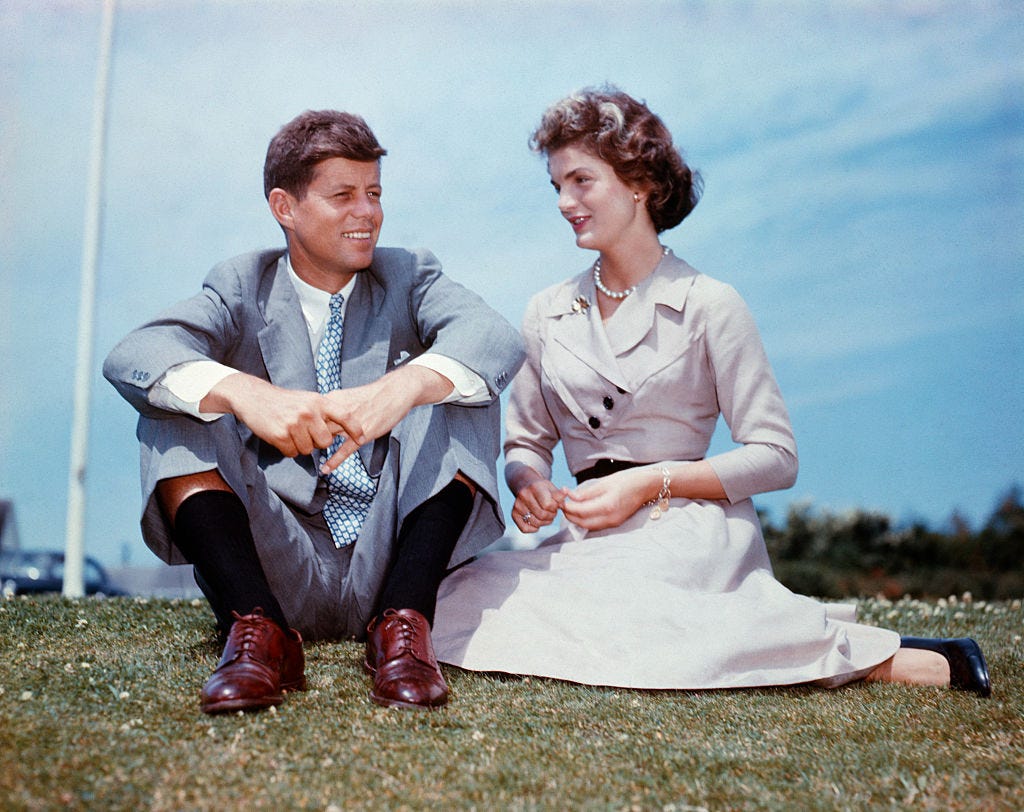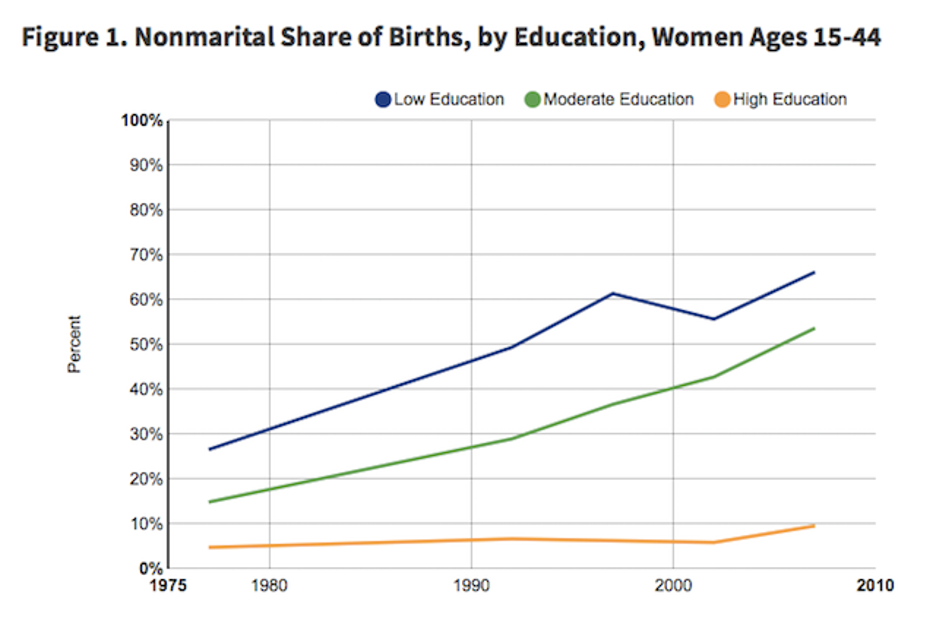The Hypocrisy of the New Upper Class
Highlighting elite duplicity
Sometimes when I talk about luxury beliefs, people will reply, “But Rob, you’re talking about elite hypocrisy. That’s nothing new. Elites have always been hypocrites. So what?”
That’s correct. (btw, “That’s not happening; it’s good that it is; it’s always been that way; and why are you so obsessed with it?” is a favored defensive maneuver of many misguided and ideologically driven people).
Still, I prefer what I call the “John F. Kennedy model of hypocrisy” to what we have now. JFK was a flawed man, but the image he presented to the American public was that he was a good husband, a good father. In his private life, though, he was a philanderer and often an absentee father and had other shortcomings. But he thought it was important to set an example for the people. And now we have the opposite. Today, our elites get married, they have kids, and for the most part, they live a very stable, conventional life. But if you ask them their opinions and attitudes around family, around marriage, around law abidingness, hard work, punctuality, integrity, honesty, and so on, they take a very relaxed attitude.
Elites used to pay lip service to conventional values but privately strayed. Now, they publicly support straying, but privately behave in a more conventional way.
A few years ago, the Yale Law School Professor Daniel Markovits wrote a book called The Meritocracy Trap: How America’s Foundational Myth Feeds Inequality, Dismantles the Middle Class, and Devours the Elite.
Not coincidentally, around the same time, Harvard professor Michael Sandel wrote another book with a similar message titled The Tyranny of Merit. Sandel has written two books I do recommend, btw: Justice: What’s the Right Thing to Do? and What Money Can’t Buy: The Moral Limits of Markets.
Anyway, it was briefly fashionable to attack meritocracy. This, among other reasons, is why many elite institutions abandoned standardized testing. The weakening of meritocratic institutions was essentially an alliance between elites and groups who traditionally perform more poorly in standardized testing. Both benefit from the removal of standardized admissions tests such as the SAT. But then elites realized that wholesale abandonment of objective measures weakened the signal of a degree from a prestigious institution, and subsequently supported reinstating meritocratic measures.
In The Meritocracy Trap, Markovits writes:
“Elites may reject traditional morality and affirm sexual freedom as matters of abstract political principle. But they live distinctively chastely, as nonpracticing libertines.”
In other words, contemporary elites walk the Fifties and talk the Sixties.
In the past, aristocrats viewed themselves as beyond the reach of conventional morality. They would sometimes mock the middle class's adherence to bourgeois standards of traditional virtue.
In his book WASPS: The Splendors and Miseries of an American Aristocracy, the author Michael Knox Beran examined the lives and habits of upper-class Americans, the WASP elite, from the mid-nineteenth to the mid-twentieth century. He writes that White Anglo Saxon Protestants had mixed feelings about their fellow citizens. These upper-crust Americans viewed ordinary Americans as “sunk in moronic darkness” and that “It is a question whether a high WASP ever supported a fashionable cause without some secret knowledge that the cause was abhorred by the vulgarians.”
When they got married, aristocratic parents provided little more than wealth and lineage to their children, who were often raised by servants and kept at a distance. Even as the influence of the aristocracy waned, an ornamental wife, as Thorstein Veblen noted, remained a key status symbol of men who belonged to the leisure class. Such a wife indicated that a husband had enough wealth to maintain a household without relying on his wife’s labor.
Today, the situation is basically the reverse. Our meritocratic elites, both men and women, tend to lead conservative personal lives with notably stable marriages. As I note in my book, among college graduates, only 25 percent think couples should be married before having kids. Their actions, though, contradict their luxury beliefs: the vast majority of American college graduates who have children are married. Despite their behavior suggesting otherwise, affluent people are the most likely to say marriage is unimportant
Modern elites devote significant personal attention to raising their children. For a male in this elite group, having a highly educated and successful wife enhances his social standing, whereas a less conventionally successful wife can give rise to status anxiety. And similarly, upper and upper-middle-class women are unlikely to want to “marry down.”
This, among other reasons, is why Scott Alexander, in his superb post about hypergamy, pointed out that assortative mating by social class is as strong as ever:
“The data show a pretty perfect status correlation between husbands and wives…I know many rich male Google programmers, but I have never seen any of them marry a stunning black girl from the ghetto. Why not? Wouldn’t the hypergamy hypothesis pronounce this a good deal for both of them? He gets a beautiful wife, she gets a rich husband? And it’s not just a race thing, I’ve also never seen them marry a beautiful hillbilly from West Virginia, or a beautiful farmer’s daughter from Modesto. I don’t even really see them marry a beautiful girl from the suburbs with a community college degree.”
Elite families are, generally speaking, focused, deliberate centers of status and achievement.
Elites tend to marry one another. They stay married. And raise their children within these marriages in order to secure dynastic continuity. Educated parents, particularly mothers, are better equipped to prepare their children for success. Divorce, which is both financially burdensome and a distraction from demanding careers and child-rearing, is less common among the wealthy. Additionally, children born outside of marriage introduce further complications and are therefore exceedingly rare in these circles. And, of course, the attributes that predict professional success are the same attributes that predict long-term romantic stability and marital commitment (intelligence, conscientiousness, impulse control, and so on). For people who lack such attributes, strong social norms and regular reminders from their society’s elites help them to combat their natural inclination to live for the moment and to instead behave in more prosocial ways.
This is why, up until relatively recently, the behavioral gaps between the poor and marginalized and the elites were much smaller. Individuals at the bottom of society used to be far more likely to get and stay married, obey the law, prioritize family stability, and adhere to the broader social norms set by their society’s elites.
These norms provided a framework that encouraged people across all social classes to adopt behaviors conducive to long-term success and community cohesion. However, as meritocratic elites have become more insular and focused on self-perpetuation, the behavioral gap between them and lower-income groups has widened.
Elite willingness to publicly model and enforce these norms has weakened, contributing to a growing divide in family structure, marriage stability, and social behavior. As a result, while elite families thrive on the virtues of education, stability, and delayed gratification, those at the lower end of the socioeconomic spectrum often struggle to replicate these patterns, leading to deeper social and economic inequality.
In 1970, both upper-middle-class and working-class married couples were equally likely to report being "very happy" in their marriages. Today, though, the share of "very happy" working-class marriages has declined by a third, while the rate among upper-middle-class couples has remained stable.
Interestingly, the abortion rate among affluent women has decreased by nearly 30 percent over the past two decades, while it has risen by nearly 20 percent among poorer women.
The gender dynamics within elite families are counterintuitive.
Elites tend to be more socially liberal than the average American. They are more likely than the average American to reject traditional gender norms that confine women to roles of wife and mother. They are happy to criticize the sexism they perceive in middle America.
But the economic structure of elite households tells a different story.
Elite gender dynamics conflict with their progressive ideals.
Large numbers of women entering the workforce, combined with intensified intra-elite competition means that elite women no longer stay home to display their leisure, as Thorstein Veblen posited. Today, women invest a ton of effort into preparing their children for success.
You might have heard that companies like McKinsey and Apple now offer tens of thousands of dollars to help cover the cost of egg freezing. Elite firms now encourage their female employees to delay motherhood and stay in the workforce for as long as possible.
In dual-income households within the top socioeconomic quintile, only 29 percent of wives earn more than their husbands, whereas in the bottom quintile, an incredible 69 percent of wives out-earn their husbands.
For all their talk of gender equity, elites are the most likely to be in marriages in which husbands outearn their wives. For all their condemnation of the sexism and misogyny of the middle and working class, it is precisely within these strata that women are more likely to outearn their husbands.
This disparity, though, helps explain declining marriage rates outside the elite. Because women tend to favor men who earn more than themselves, marriages are less likely to form when women earn more than men.
Elites have somehow retained the trappings of a conventional married life while promoting norms, values, and policies that inhibit it for others.
I’ll end here with a quote from Chris Rock’s 2023 standup comedy special:
“If you’re in a neighborhood in America where most of the women aren’t working, it’s a good neighborhood. If you’re in a neighborhood where most of the men aren’t working, you are in danger.”




I’m a stay-at-home mom. My kids are 13 & 11 and I can’t tell you how many times they’ve thanked me making my job their care. My whole life is using my time to listen to them, drive them everywhere, make sure they do well at school, remind them to do their chores and practice their instruments, read books, and we watch k-dramas and football together as a family. I also keep my house clean and cook relatively decent healthy meals.
I love talking with strangers. We travel quite a bit, and if the person I talk to ever gets around to asking me what I do, when I say I stay home, the reaction is usually praise akin to telling a two-year-old he was very smart for putting the block in the square hole. “What an important job that is!”
I don’t tell them I have a master’s degree in educational psychology, or that I’ve authored several novels, or that I can read and write in Korean and speak conversationally.
I’m sure there are many jobs I could do, I just love doing this the most- it’s the best for us and that’s the most I can say about it. I can’t advocate this lifestyle for anyone else. Some think I got here because of “luck” that my husband does well when we actually had to work hard and make many sacrifices along the way and I would tell anyone that it’s worth it, if only I could.
Shit-libs, they make my skin crawl.
I am surrounded by them.
My wealthy neighbourhood is rife with self aggrandizing posers saying the right thing in that very particular tone of voice: a faux air of saccharine compassion, a self satisfied confidence in their own correctness and a smug “doing the right thing” superiority.
Our author is right, “doing the right thing” is a consumer product, a luxury good. My street has one American car otherwise, BMW, Audi, Volvo, Lexus. It’s all one piece.
Their kids are weird.